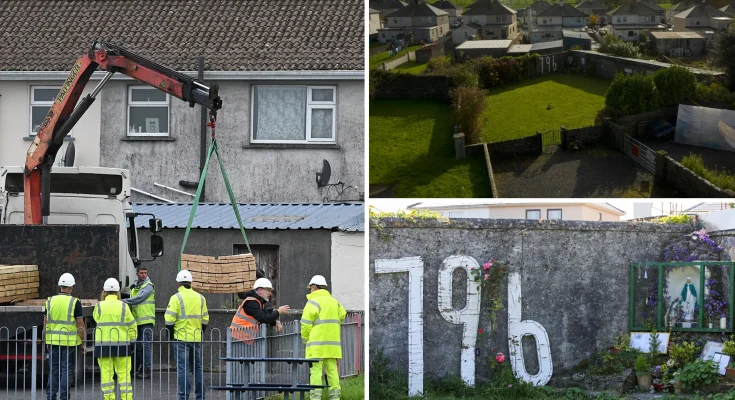Many of the infant remains are feared to have been dumped in the cesspool known as “the pit” at the former institution in the small town of Tuam, County Galway, local historian Catherine Corless told Sky News.
In total, 798 children died at the home between 1925 and its closure in 1961, of which just two were buried in a nearby cemetery, Corless’ research found.
The other 796 children’s remains are believed to be under the site of the Bon Secours Mother and Baby Home, which was demolished in 1971 and is now surrounded by a modern apartment complex.
Bon Secours, known locally as The Home, was a maternity home for unmarried mothers and their children, run by a religious order of Catholic nuns.
They were separated from their newborn children, who would be raised by the nuns until they were adopted, often without the consent of their families.
The full scale of the tragedy at Bon Secours was only uncovered in 2014 thanks to Corless’s findings.
Now, finally, more than a decade on, a team of investigators began their forensic investigation this week.
It is expected to take up to two years to identify the remains of the infants and give them a dignified reburial and offer some degree of closure to survivors.
“I don’t care if it’s a thimbleful, as they tell me there wouldn’t be much remains left; at six months old, it’s mainly cartilage more than bone,” Annette McKay, whose sister is believed to be one of the 798 victims, told Sky News.
Her mother, Margaret “Maggie” O’Connor gave birth to a baby, Mary Margaret, at the home after she was raped at the age of 17.
The girl died six months later, and her mother only found out when a nun told her.
“She was pegging washing out and a nun came up behind her and said ‘the child of your sin is dead,’” said Annette, who now lives in the UK.
Bon Secours was just one institution that made up a network of oppression in Ireland, the true extent of which has only been revealed in recent years.
Mothers at Bon Secours who “reoffended” by having more children out of wedlock would be sent to Magdalene laundries, the infamous Irish institutions for so-called “fallen women,” usually run by Catholic orders but quietly supported by the state.
Originally the term “fallen women” was applied mostly to sex workers, but the Magdalene laundries would come to take in “seduced” women, victims of rape and incest, and female orphans or children abandoned or abused by their families.
The last of the Magdalene laundries only closed their doors in the 1990s.
Ireland’s government issued a formal state apology in 2014 and, in 2022, a compensation scheme was set up which has so far paid out the equivalent of $32.7 million to 814 survivors.











